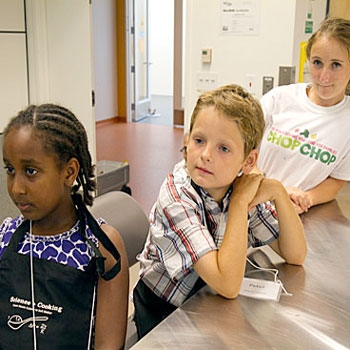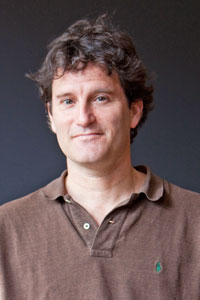News
Students (from left) Ruth Shiferaw, 9, Peter Murphy, 9, and Chloe Rosen, 17, listen to Somerville cheesemaker Lourdes Fiore Smith describe how to make string cheese.
The 20 rambunctious kids gathered at Harvard last Monday looked like typical day campers. But instead of sunscreen and bug spray, their knapsacks contained bamboo cutting boards and measuring spoons. The craft project holding their rapt attention wasn’t a friendship bracelet or macaroni art, but hand-pulled string cheese. And their counselors included none other than Bill Yosses, the White House executive pastry chef, who hovered over students’ workbenches in the basement of the Northwest Lab.
“I’m going to tell Mrs. Obama how great you were today,” Yosses told his charges.
The children, Boston and Cambridge students between the ages of 9 and12, were taking part in “Kids’ Science and Cooking,” a new program hosted by the School of Engineering and Applied Sciences (SEAS) in cooperation with ChopChop, a nonprofit cooking magazine for kids. An offshoot of the University’s popular “Science and Cooking”course and public lecture series, the two-week day camp is built on the idea that time in the kitchen and the laboratory — both intimidating places to newcomers — is a great opportunity for children to explore their natural curiosity and to learn science, math, and healthy habits,too.
“The idea is to make science more interesting by using cooking, and vice versa,” said Sally Sampson, founder of Watertown-based ChopChop.
The program’s developers — among them “Science and Cooking” developer Michael Brenner, Glover Professor of Applied Mathematics and Applied Physics, and Naveen Sinha, a doctoral candidate in applied physics at SEAS — had planned an ambitious agenda. In their 10 days on campus,students would learn from scientists, mathematicians, and rock-star chefs about pickling, emulsion, fermentation, and more. They would be responsible not only for making their own lunches, but for prepping ingredients and cleaning up after themselves in the kitchen.
Topics: Cooking
Cutting-edge science delivered direct to your inbox.
Join the Harvard SEAS mailing list.
Scientist Profiles
Michael P. Brenner
Michael F. Cronin Professor of Applied Mathematics and Applied Physics and Professor of Physics




